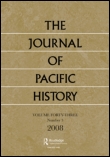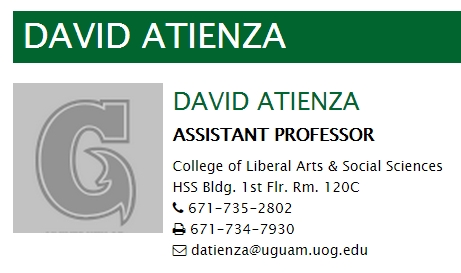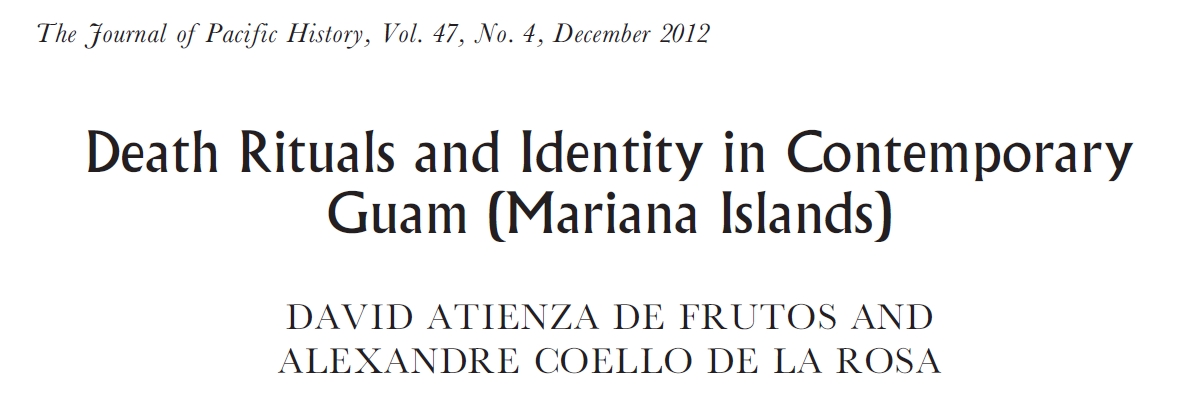Suppose an anthropologist, presumably an expert in the study of Chamorro culture and history, published an article on contemporary funeral practices on Guam in a respected, peer-reviewed academic journal. And suppose the expert claimed, when describing a typical contemporary Chamorro Catholic funeral in that article, said:
…the casket is not closed until the end of the funeral mass…
You’d probably think that the expert allowed a “typo” to remain in his article. After all, anybody who has attended a few funerals on Guam knows that the casket is closed after the viewing and immediately before the funeral mass, and then remains closed.
But suppose, reading more in the same paragraph, you see that the professor made the same mistake again:
…At the end of the mass with the body present, the casket is closed…
The casket is closed at the end of the Mass? Now you know that this is not a typographical error. When the casket gets closed may seem inconsequential, but his statement shows that the professor must have never attended a Chamorro funeral prior to writing the article on funeral practices on Guam! It’s very easy to attend funerals on Guam, so you’d be tempted to doubt the credibility of anything else the professor might have said pertaining to contemporary Chamorro funeral practices if it was obvious that he didn’t even bother to observe even a few funerals himself. Right?
Well, such an article has been written by David Atienza, a Neocatechumenal missionary, assistant professor at the University of Guam, and visiting professor at the Neocatechumenal Redemptoris Mater Seminary on Guam. Here’s the official citation to the article in the Journal of Pacific History:
 David Atienza de Frutos & Alexandre Coello de la Rosa (2012): Death Rituals and Identity in Contemporary Guam (Mariana Islands), The Journal of Pacific History, 47:4, 459-473. http://dx.doi.org/10.1080/00223344.2012.743431
David Atienza de Frutos & Alexandre Coello de la Rosa (2012): Death Rituals and Identity in Contemporary Guam (Mariana Islands), The Journal of Pacific History, 47:4, 459-473. http://dx.doi.org/10.1080/00223344.2012.743431
Here’s a snapshot of part of the title page:
On page 468 of Volume 47, Issue 4, of the Pacific Journal of History we read:
And later on that same page:
Again, the exact time the casket is closed might seem inconsequential, but it’s very tempting to doubt Professor Atienza’s credibility about anything else he might say on this topic, if he didn’t even get the easy stuff right. And the professor did indeed make some other assertions about Chamorros and their beliefs and practices regarding death. In the same article he wrote:
So, in Dr. David Atienza’s “expert” opinion, Chamorros believe that even unrepentant murderers will go to heaven if only their families pray the rosary after they die. Repentance and conversion are less important than rituals and devotions for the indigenous people of Guam, he says.
Unfortunately this “expert” in Chamorro beliefs neglected to back up this particular claim with any shred of evidence whatsoever, and included no polls or studies, and no credit to any other source for this assertion.
You’re probably flabbergasted, right? Well, remember that Professor Atienza is a Neocatechumenal missionary, and brings to Guam his sect’s animus toward natural religiosity, as well as a conviction that Catholicism has been contaminated by archaic religions.
Are you an academic hack, Professor Atienza?
References and Related Links

- The Xiphias Gladius Project: Details about the team of Neocatechumenal academics teaching the thought of Rene Girard at Redemptoris Mater seminaries around the world.
- Contaminado! – A close look at the mission statement of the Xiphias Gladius project team.
- A Neo Seminary Professor’s View of Chamorro Prayers for the Dead – Professor Atienza made similar assertions at the Round Table on Suicide in Guam and Micronesia, held at the Blessed Diego Luis de San Vitores Catholic Theological Institute for Oceania in November, 2010.
- Covering His Tracks – A Neocatechumenal professor’s attempt to remove his outrageous writing from the internet doesn’t quite work out.
Tags: Neocatecumenale, Neocatecumenal, Redemptoris Mater Seminary





This is very disturbing to find out that Guam’s funeral practices are being misrepresented in a so-called referried journal. I wonder if Pres. Underwood is aware of the inaccuracies in this article. I will email him and bring it to his attention. The anthropology dept at UOG includes the title of the article in their bio of this professor. They are clueless too.
As I mention in my post, the timing of the closing of a casket at a typical funeral in Guam may seem inconsequential, but it’s probably the easiest “fact” to verify if one is writing an article entitled “Death Rituals and Identity in Contemporary Guam” for a peer-reviewed journal. And if the author neglected to check the truthfulness of his simplest assertions, we shouldn’t automatically assume that his other assertions are correct. And in this case, he says some terrible things about Chamorro beliefs. By the way, the professor said some of the same things at a Round Table on Suicide in Guam and Micronesia, held at the Blessed Diego Luis de San Vitores Catholic Theological Institute for Oceania in November 2010.
Let’s talk a bit more about our habit to pray for the dead here on Guam. Atienza, our academic hack and Neocatechumenal missionary, makes outrageous claims about Chamorro beliefs and then fails to back them up with any evidence, polls, studies, or references to the work of others.
I personally am convinced that we follow Catholic teaching here with respect to praying for the dead. We pray for a deceased person even if we suspect that he’s a “recalcitrant murder” (Atienza’s phrase) because we simply don’t know whether he repented at the very last second – only God knows. And to not pray for his soul would be…wait for it….judging that person. Not only that, but we pray with hope, and hope is a virtue, so our prayer for the dead is a virtuous prayer.